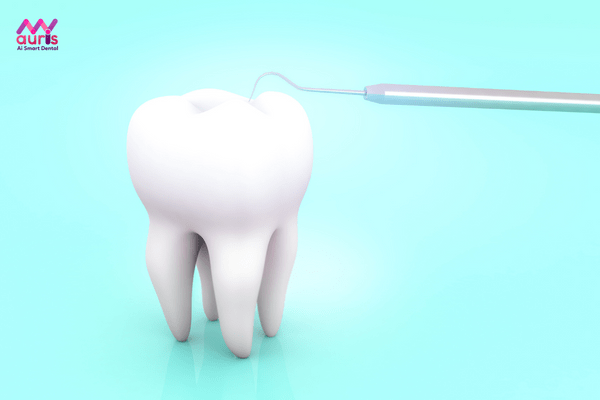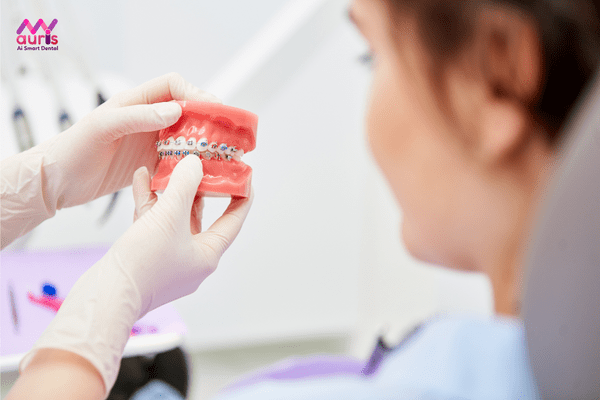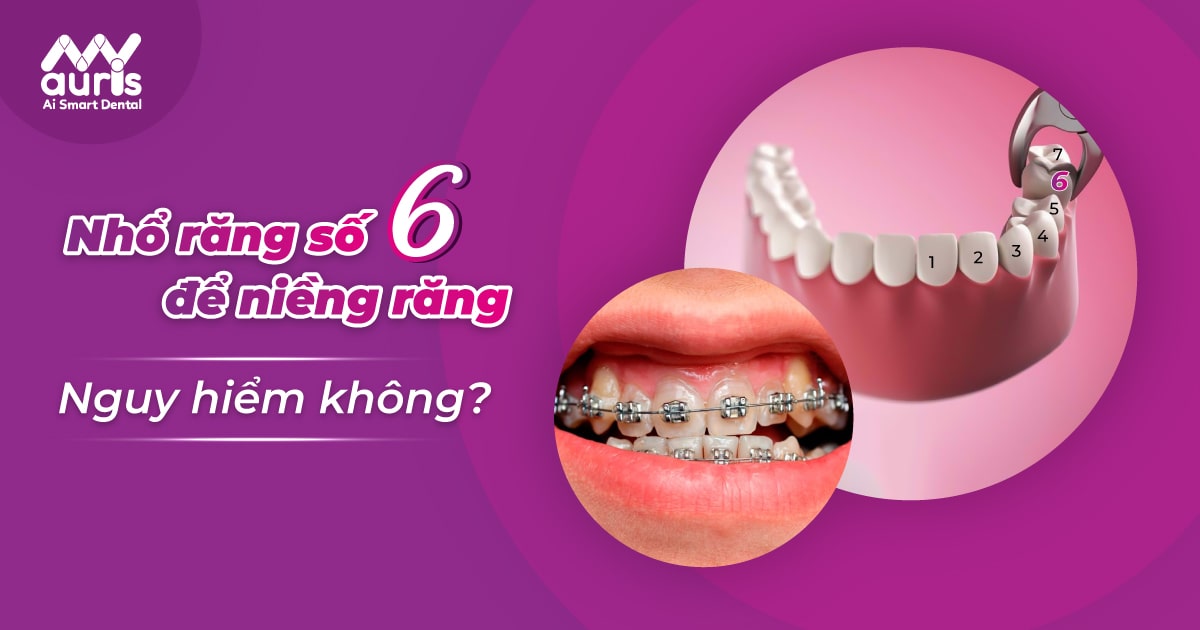Braces are a dental technique that helps adjust teeth to the correct position on the jaw to create even, bright white teeth. However, in some cases, teeth will have to be extracted to create space for the teeth to move easily. The problem of removing tooth number 6 for braces makes everyone worried, so should remove tooth number 6 for braces?
Which tooth is number 6?
Tooth number 6 is also known as the forbidden tooth, molar or molar. This is the first human molar. This tooth is quite important because it takes on the main function of chewing.
Tooth number 6 is extremely important in chewing, biting, and grinding food, almost all chewing force will be concentrated on this tooth. Besides, tooth number 6 is also considered the “key” to future bite. Because tooth number 6 grows crookedly, it will lead to a crowded and misaligned bite later on.
Tooth number 6 in the upper jaw has 3 roots, the lower jaw has 2 roots and has the largest number of root canals among human teeth. The number of root canals for tooth number 6 is 3 root canals and can be up to 5 root canals. To know the exact number of root canals in your tooth, people can go to the dentist/hospital for an X-ray and be diagnosed by a doctor.

Because of its characteristics and role, extracting tooth number 6 for braces can be dangerous if done due to inexperienced doctors and unreliable dental clinics.
Is it advisable to extract tooth number 6 for braces?
Extract tooth number 6 for braces teethshould not, the answer is no. According to doctors, losing tooth number 6 will cause many consequences for oral health as well as general health.
- Decreased chewing force, difficulty in eating: tooth number 6 is the main chewer, if removed, the chewing force is no longer as good as before. The ability to bite, tear and crush food is not guaranteed, food is not crushed, affecting the digestive process. In the long term, it affects the health of the stomach.
- Shifting other teeth, causing bite misalignment: when tooth number 6 is lost, the remaining teeth tend to tilt and shift toward the position in the missing tooth space. Therefore, bite misalignment is possible, more serious than facial deformation.
- Aesthetic effects: if tooth number 6 is lost, the other teeth have to “bear” the task of chewing, especially the front teeth. When the front teeth use too much force and are overloaded, it will cause the teeth to stick out, causing loss of oral and facial aesthetics.
- Jaw bone loss: Long-term tooth loss causes the jawbone at this location to disappear, affecting the facial structure, causing wrinkled, sagging facial skin, sunken cheeks, etc.

After knowing these consequences, surely everyone has the answer for themselves If you decide, you should go to the dentist first to see if the tooth situation is the most suitable treatment. If the tooth is normal and there is no effect, you should not extract it. tooth
If your tooth number 6 falls into the following cases, the doctor may prescribe extraction to ensure oral health as well as improve the effectiveness of braces:
- Tooth decay: cavities often appear in large molars because they are exposed to more food without proper cleaning. If tooth number 6 has serious decay and is not corrected, extraction before braces will affect the jaw structure and has the risk of spreading to other teeth.
- Chiped teeth: if the tooth is broken or has a large chip that cannot be restored, it is necessary to have it extracted before braces.
- Teeth that do not have the function of chewing: these are cases where tooth number 6 is crooked, impacted, and not in the correct position. should not be able to chew well.
- Teeth with severe periodontitis, extraction is necessary. Because the longer the tooth is left, it will greatly affect the pulp and cannot be treated.

If tooth number 6 is lost, can you get braces?
If tooth extraction is not indicated and tooth number 6 was lost before, then whether or not you can get braces is also very important. However, to determine exactly, you should see a doctor for an examination, then the doctor will consider the dental condition before proceeding with braces.
In case of missing 1 tooth number 6
If you lose 1 tooth number 6 or have problems as mentioned above that require extraction, you can still perform braces normally.
At this time, the doctor will base on the bone condition, ability as well as the functioning status of other teeth to give a good braces direction.
When performing braces on a missing tooth number 6, the doctor will consider the possibility of pulling tooth number 7 into the position of tooth number 6, because tooth number 7 is a tooth with many roots. Next, use braces to pull the teeth closer together, helping to cover the gap of tooth number 6.

In case I lose 2 teeth number 6
Also Similar to the case of losing a tooth, doctors will initially consider pulling the position of tooth number 7 to the space of tooth number 6. The purpose of this is to ensure aesthetics, help the jaw bone not to disappear and improve the ability to chew. Braces can be done normally. If you lose teeth and leave a large gap, braces will not be effective. At this time, the doctor will advise you on the most suitable remedies.
Hopefully the information in the article that My Auris dentistry shares will help people know more about tooth number 6 extraction. Should braces be used? From there, you can learn and learn from experience when doing it on your teeth.
Anh Thy





